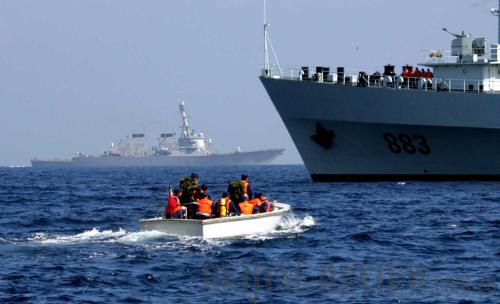|
 |
|
SOS: Chinese and U.S. rescuers sail toward an "endangered ship" during a joint search and rescue exercise by the two countries' navies in the South China Sea in November 2006 (ZHA CHUNMING) |
China believes priority should be given to the objectives and purposes of a country's security strategy when it comes to military transparency. The PLA has made clear to the world its strategic purposes and objectives by issuing white papers and holding press conferences.
Ma Xiaotian further outlined the objectives of China's security strategy in the Asia-Pacific region as: protecting China's security and development; ensuring lasting peace and common prosperity in the region and promoting regional harmony.
China has always advocated Chinese and U.S. policymakers handle bilateral military relations from a strategic perspective. In other words, the two countries should strengthen military exchanges and cooperation for the sake of maintaining stability in the Asia-Pacific region and beyond.
The United States, however, remains suspicious. Dubious about the modernization of the Chinese armed forces, it questions the motives and purposes of China's military development. That's why it often plays up military transparency issues.
The issue of military transparency continues to haunt Sino-U.S. military relations primarily because of the absence of strategic trust between the two countries. Although both issue documents on defense—China's national defense white papers and U.S. quadrennial defense review reports—definition serves different purposes respectively. China aims to enhance mutual trust while dispelling suspicions. The United States, by contrast, intends to deter opponents by showing off its military clout.
Without mutual trust, transparency is only a mirage. China and the United States need to fully establish strategic trust before they reach agreements on military transparency.
Breaking the cycle
Since the establishment of diplomatic relations more than 30 years ago, Sino-U.S. military ties have evolved amid suspensions. Both sides hope to break this negative cycle, with little achieved to date.
China views military-to-military relations as an important part of the overall Sino-U.S. relationship and is committed to developing bilateral military ties. Over the past decades, the two countries' armed forces have exchanged high-level visits, conducted defense consultations, and shared professional knowledge. Their navies have held joint search and rescue exercises, in addition to making port calls to each other's countries. Moreover, a hot line has been established between China's Ministry of National Defense and the Pentagon.
These developments have not only served the interests of both nations but also contributed to the peace and stability in the Asia-Pacific region and the world at large.
While China is determined to advance Sino-U.S. military relations, the United States continues to point its finger at China's defense modernization. As the two countries' relations move into a new era, new approaches and measures are needed to ensure their military-to-military relations develop in a stable, uninterrupted way.
To that end, Chinese and U.S. militaries should make joint efforts to establish mutual trust through increased exchanges. While reaching out to each other, they should see to it each country's core interests are accommodated and sensitive issues in bilateral relations are addressed.
The author is a research fellow with the China Institute of International Studies
U.S. Pledge
…the United States Government states that it does not seek to carry out a long-term policy of arms sales to Taiwan, that its arms sales to Taiwan will not exceed, either in qualitative or in quantitative terms, the level of those supplied in recent years since the establishment of diplomatic relations between the United States and China, and that it intends gradually to reduce its sale of arms to Taiwan, leading, over a period of time, to a final resolution. In so stating, the United States acknowledges China's consistent position regarding the thorough settlement of this issue.
—Article 6 of the China-U.S. August 17 Communiqué of 1982 | 